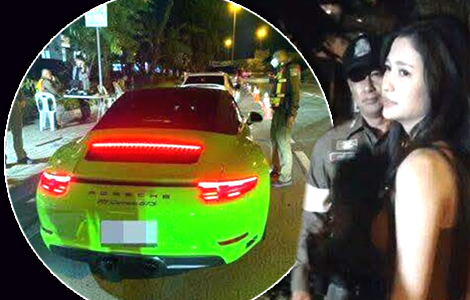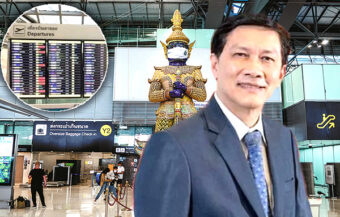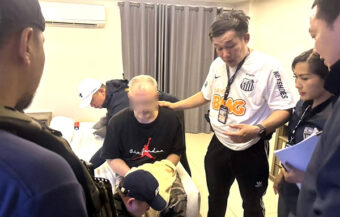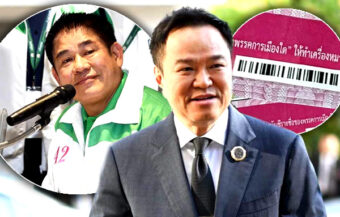Bangkok actress Marie Broenner refused to exit her green Porsche at a Sunday drink-driving checkpoint for nearly an hour, defied the breathalyser test, while her boyfriend obstructed police. Both now face serious legal charges under strict Thai law.
A high-profile incident in Bangkok in the early hours of Sunday has ignited a national debate on drink driving after police stopped a luxury green Porsche Carrera driven by 33-year-old Thai actress Ms. Marie Broenner, who flatly refused to roll down her window or exit the car for nearly an hour. She was accompanied by her boyfriend and another passenger. Afterwards, when she finally stepped out, she still refused a breathalyser, while her boyfriend aggressively pressured her and obstructed officers, forcing police to detain both, charging Ms. Broenner with drunk driving and her companion with obstruction of justice, though she was later granted bail at Wang Thonglang Police Station and is due in court Monday. Police have warned the public that refusing a breath test carries the same penalties as drunk driving and will be prosecuted to the fullest extent of the law.

Drivers who refuse to take a breathalyser test face penalties equal to drunk driving, police confirmed. Consequently, refusal can result in imprisonment, fines, and license revocation. Authorities stress that no one, regardless of fame or connections, is exempt from the law.
On August 24, 2025, at approximately 3:10 a.m., Wang Thonglang Police Station officers were conducting a routine alcohol checkpoint. They were stationed in front of a motorway showroom on Pradit Manutham Road. Traffic Inspector Police Lieutenant Colonel Chalermphon Phachala led the operation. The team’s goal was to enforce traffic discipline and prevent drunk driving accidents.
Checkpoint in Bangkok with police enforcing traffic laws to prevent drunk driving accidents early Sunday
At that hour, a green Porsche sedan approached the checkpoint. The driver, later identified as Ms. Marie Broenner, 33, a well-known actress and model, refused to stop immediately. Consequently, officers signalled for the vehicle to halt, but she did not comply.
Inside the car, a prominent businessman, Mr. Atsamakorn Singhasikornkul, sat in the front passenger seat. Another woman occupied the back. Officers instructed Ms. Broenner to roll down her windows and exit the vehicle. Nevertheless, she repeatedly refused, escalating tension at the checkpoint.
The businessman began verbally abusing officers, loudly claiming connections to a high-ranking police official. Meanwhile, Ms. Broenner remained noncompliant. Consequently, officers had to insist multiple times for compliance, explaining the law repeatedly.
Eventually, after nearly an hour of negotiations, the occupants finally exited the vehicle. However, the tension remained high. The businessman continued insulting officers and obstructing their duties. He even claimed his girlfriend needed to urinate first. Officers warned that excuses would not exempt anyone from legal obligations.
Celebrity driver refuses checkpoint orders, leading to hour-long standoff with police on Pradit Manutham Road
Police observed clear signs of intoxication from Ms. Broenner. Consequently, she was charged with driving under the influence based on her behaviour and physical symptoms. All three occupants were transported to Wang Thonglang Police Station for legal processing.
Upon arrival, Ms. Broenner continued to refuse the breathalyser test. Consequently, police charged her under Section 142 of the 1999 Land Traffic Act. This section presumes intoxication for anyone refusing the test. Violators face imprisonment up to one year and fines ranging from ฿5,000 to ฿20,000. Additionally, licenses may be suspended for at least six months or permanently revoked.
Meanwhile, the businessman faced charges for obstructing officers, insulting law enforcement and defaming officials during the operation. Police described his behaviour as aggressive and persistent. He challenged officers to confrontations several times, further aggravating the situation.
Police Lieutenant Colonel Chuthapong Chandilokchote, investigating officer, confirmed that both Ms. Broenner and her companion were released on bail. Ms. Broenner’s bail was set at ฿20,000. Both are scheduled to appear at Ratchada District Court on August 25, 2025, to face formal charges.
Legal charges filed against actress and companion after refusal to comply with alcohol checkpoint in Bangkok
Senior Sergeant Major Udomsak Phromchat, Traffic Squad Commander at Wang Thonglang Police Station, described the checkpoint procedure. Officers first attempted to communicate the law clearly. Nevertheless, the driver and companion refused to comply. Consequently, officers were forced to proceed with legal action.
The Central Investigation Bureau has emphasised that refusal to take a breathalyser test is legally equivalent to drunk driving. Consequently, authorities stress that no claim of connection or social status can prevent prosecution. Moreover, refusal alone triggers the same penalties as confirmed intoxication.
This incident has drawn widespread attention because of the fame of those involved. Ms. Broenner is a recognised actress and socialite, while her companion is a prominent businessman. Media outlets covered the confrontation extensively. Social media quickly amplified video clips and photos from the scene, spreading the story nationwide.
Refusal to submit to breathalyser triggers legal penalties and attracts widespread media and social attention
Traffic safety advocates argue that this case highlights the importance of following traffic laws. Alcohol-related accidents remain a leading cause of fatalities in Bangkok. Consequently, checkpoints are considered essential for public safety. Advocates also warned that celebrity behaviour should not be a barrier to compliance.
Legal experts note that refusal to undergo an alcohol test also constitutes disobedience under the Land Traffic Act. Therefore, anyone refusing a breathalyser may face multiple charges. These include drunk driving, obstructing officers and resisting legal duties. Even if alcohol was not consumed, refusal triggers severe penalties.
The Wang Thonglang incident provides a clear example of law enforcement authority in action. Officers repeatedly explained legal requirements and the consequences of noncompliance. Nevertheless, Ms. Broenner continued to refuse, while her companion actively obstructed officers. Consequently, formal charges were necessary to enforce the law.
Authorities emphasise that celebrity status does not confer immunity. Police officers maintain that laws apply equally to all citizens. Any attempt to leverage personal connections will not prevent prosecution. Consequently, individuals must comply with legal procedures during checkpoints, regardless of social rank.
Refusal to cooperate highlights need for strict law enforcement regardless of social status
At the police station, investigators followed standard protocol. Ms. Broenner was informed of her legal rights and processed under Section 142. Her companion was charged separately with obstruction and defamation. CCTV footage and detailed officer reports corroborated all events.
The Royal Thai Police issued a public reminder on Sunday morning. It explained that refusing a breathalyser carries serious consequences. Imprisonment may extend to one year and fines may reach ฿20,000. Additionally, driver’s licenses may be suspended or permanently revoked. Police stress that these penalties exist to protect public safety and reduce alcohol-related accidents.
Public reaction has been intense. Many criticised both Ms. Broenner and her companion for poor behaviour. Others debated whether penalties for refusing a breathalyser are sufficient. Legal experts suggest that strict enforcement is essential to prevent similar incidents. Consequently, authorities hope this case serves as a cautionary tale.
Police emphasised that breathalyser checkpoints are routine and necessary. They aim to reduce traffic fatalities and enforce road safety. Officers explained that all drivers must comply. The law, therefore, ensures accountability for every motorist.
Police stress breathalyser checkpoints are routine and refusal will be treated as seriously as drunk driving
Investigators continue to examine all details of the incident. Witness statements, CCTV footage and officer reports are being reviewed. This will clarify the full extent of obstruction and potential violations. Ms. Broenner and her companion are required to appear in court. Failure to attend will result in further legal consequences.
The Wang Thonglang case highlights the strictness of Thai traffic law, particularly Section 142 of the 1999 Land Traffic Act.
The standoff also raised concerns about public behaviour during police operations. Officers reported verbal abuse and physical obstruction from the passenger. They emphasised that such interference is unacceptable under any circumstances. Consequently, additional charges were filed for obstruction, insulting and defaming officers.
Compliance with traffic laws is mandatory to prevent obstruction and ensure public safety at checkpoints
The incident highlights the importance of public cooperation during law enforcement checks. Officers must maintain order while ensuring legal procedures are followed. Refusal to cooperate undermines safety measures and delays enforcement. This case demonstrates why compliance is essential to prevent accidents and legal escalation.
Ms. Marie Broenner and her companion ignored repeated requests from officers. They obstructed law enforcement and refused legal procedures. Consequently, both face serious legal repercussions. Ms. Broenner is charged with drunk driving, while her companion faces obstruction and defamation charges. Bail has been granted, but both must appear in court.
Ultimately, this case serves as a stark warning. Refusing a breathalyser test carries severe penalties. Imprisonment, fines, and license revocation are real possibilities. Fame or connections do not grant immunity. Compliance with police checkpoints protects all road users and preserves public safety.
The high-profile case also demonstrates that law enforcement will not tolerate obstruction. Officers must perform duties without interference. The public is reminded that verbal abuse or physical resistance will result in additional legal consequences. Consequently, citizens must respect police officers doing their duty under proper legal procedures.
Road rage act by an ex-politician’s son shows old loyalties and dynastic power is still strong in Thailand
Four policemen jailed for five years by Criminal Court over Taiwanese actress bribe at checkpoint
Traffic safety authorities urge drivers nationwide to understand their legal responsibilities. Refusing a breathalyser may result in the same punishments as drunk driving. Consequently, drivers should comply promptly to avoid imprisonment, fines and licence revocation. The law applies equally to all, regardless of social or professional status.
The Wang Thonglang checkpoint case will be closely monitored in the coming days. Court proceedings on August 25, 2025, will determine the final legal outcomes. Authorities reaffirm that all actions were carried out under established legal procedures.
Join the Thai News forum, follow Thai Examiner on Facebook here
Receive all our stories as they come out on Telegram here
Follow Thai Examiner here
Further reading:
Interpol Red Notice for ‘Boss’ Vorayuth as Police authorities in Bangkok seek to bring him to trial
Assistant Attorney General in Red Bull case named as a senior prosecutor to central Bangkok district
Murder charge against ‘Boss’ Yoravuth should have been weighed after mowing down policeman
Explosive report on the Red Bull scandal exposing ‘corruption’ due at the Prime Minister’s office
Expert stands by evidence that Red Bull Boss Vorayuth’s Ferrari was travelling at 177 km/ph


















